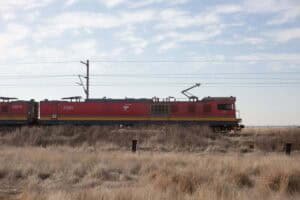Transnet spent R1 billion a month in debt servicing costs.

Troubled state-owned rail and ports operator Transnet swung to a full-year loss of R5.7 billion for the year ended 31 March 2023, significantly down from a profit of R5 billion for the previous year.
The group blamed lower rail volumes, which it said were largely affected by torrential rains in KwaZulu-Natal province during the first half of 2022 that led to severe floods. It also blamed operational inefficiencies as well as hefty operating expenses amid an inflationary trading environment.
13,6% slump in Transnet rail volumes
Transnet reported that rail volumes slumped 13.6%. It said that apart from the KwaZulu-Natal floods, volumes were impacted by cable theft, infrastructure vandalism, equipment challenges and operational inefficiencies in the general freight and export coal businesses.
Speaking about the financial performance at a results presentation on Friday, Transnet CFO Nonkululeko Dlamini said the company was hit by a reduction of volumes to 149 million tonnes, from 173 million tonnes.
“With improved revenue, we would have done much better… We contained costs as far as we [could] in the context of inflation,” added Dlamini.
Decrease in earnings
The group’s latest results show that earnings before interest, taxes, depreciation and amortisation (Ebitda) decreased 2.1% to R23 billion, while operating expenditure increased 2% to R45.9 billion.
Revenue increased by a sluggish 0.6% to R68.9 billion, from a previous R68.5 billion, helped by positive port and pipeline operational performance, the company said.
ALSO READ: Brics Bank to propel SA rail upgrade with huge loan to Transnet
Significant debt
“But there are other elements which you can’t move away from…We’ve got a significant amount of debt, and we pay significant interest expense in that regard in line with what we owe our lenders, so there wasn’t much of movement in a number of areas other than an impact of [a] reduction in volumes,” Dlamini said.
Speaking about the group’s debt position, Transnet’s newly appointed chairperson Andile Sangqu said the company is currently developing a turnaround strategy and an implementation plan for the business, which is still to be handed to the board.
He said a key part of the turnaround plan is a financial restructuring of the company, which currently has a monthly debt servicing costs bill of R1 billion.
“[This] means that over a 12-month period, debt alone is R12 billion [and] that continues to throttle the free cash flows of a company, and it reduces its ability to have sufficient cash to do maintenance, repairs and procure spare parts,” Sangqu said.
“So, we certainly need a completely new configuration in terms of our debt and how we restructure the organisation going forward,” he said.
ALSO READ: Transnet CEO Portia Derby’s comments on trucking industry ‘taken out of context’
Transnet key risk: Protracted poor business performance asset impairments
The company, which reported an impairment of non-financial assets of R4.5 billion, up from R2.1 billion, cited protracted poor business performance asset impairments as key risks.
“There has been [a] significant increase in the impairment of non-financial assets due to devaluation of some of the rolling stock and rail network infrastructure,” Transnet said.
It currently sits on an overall asset base of R364 billion and has seen a reduction of 25 units in its available locomotive fleet, said Transnet CEO Portia Derby.
She said within Transnet’s totally available 1 854 fleet, 377 are unavailable as long-standing locos.
“So that means we just have north of 1 400 of locomotives, [it’s] obvious that it should lead to a poor performance,” Derby said.
By the end of the reporting period, Transnet had 315 long-standing locomotives, up from 106 during it’s 2019 year.
Derby added that the company has been granted permission to undertake procurement in advance of securing all of the funding it needs, to assist it in returning long-standing locos into service sooner.
NOW READ: Gordhan hits back after Mbalula’s Transnet jibe
This article is republished from Moneyweb under a Creative Commons licence. Read the original article.
Support Local Journalism
Add The Citizen as a Preferred Source on Google and follow us on Google News to see more of our trusted reporting in Google News and Top Stories.






